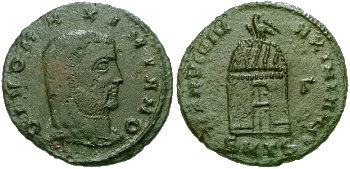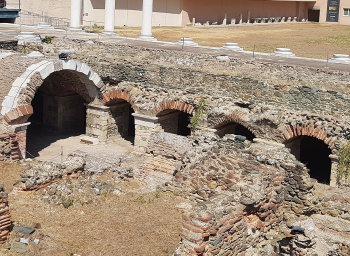[The Unknown Churches of Paul!]
1Thessalonians is the 16th shortest book in the entire KJV in terms of words, the fifth shortest in terms of chapters, and the 16th shortest in terms of total verses. This first letter to the church in Thessalonica, which Paul started, is listed as the 8th of 14 books written by him listed in the KJV New Testament.
[Where Is Thessalonica Located?]
This first epistle to those in Thessalonica, in Scripture's original manuscript order, is in the sixth of seven sets of writings known as the Epistles of Paul.
Date Written
1Thessalonians, dated to 50 A.D., is the fifth oldest New Testament book. Chronologically, it is also Paul's first writing, coming only one year before he wrote to Thessalonica a second time.
[Paul's Second Missionary Journey Map]
The Author
Apostle Paul wrote 1Thessalonians during his long stay in Corinth which ran from late summer of 50 A.D. to Autumn of 52. He was about 48 years old when he wrote to the church at Thessalonica.
1Thessalonians Chapter Outline
Chpt. 1: Paul's first New Testament writing opens with a greeting from him, Silvanus (Silas) and Timothy. His first chapter is dedicated to praising those at Thessalonica for their faith, love and endurance (1Thessalonians 1:2 - 3).
Paul reminds the church that the gospel they heard was backed by God and came with the power to turn people into his elect (verses 4 - 5). He also commends them for staying faithful in the midst of persecution and reveals that other new churches are aware of their faithfulness to God (verses 6 - 8). Their readiness to turn from worshipping idols to serving the true God is also praised.
For they themselves shew of us what manner of entering in we had unto you, and how ye turned to God from idols to serve the living and true God (1Thessalonians 1:9).

Chpt. 2: Paul opens the chapter by reminding those at Thessalonica that both he and Silas, before arriving in the city, were persecuted in Philippi. Their mistreatment included being arrested, flogged and thrown into the innermost reaches of prison where their feet were placed in stocks (1Thessalonians 2:1 - 2, Acts 16:22 - 24)!
[Paul's Philippian Jail Cell!]
The Thessalonians heard the pure gospel preached with honesty and without pretense. The word they heard was not altered so that it could either please or flatter others. It was also preached without ulterior motives such as trying to merchandise potential believers (verses 3 - 6).
The church is reminded that Paul and Silas conducted themselves in a holy manner when they evangelized the city. They were even willing, instead of exercising their right to receive support from the brethren, to work in order to pay their expenses (verses 9 - 12)
The Thessalonicans were not the only Christians persecuted by their neighbors. Paul reminds them that those in Judea also suffered like they did.
For ye, brethren, became followers of the churches of God which in Judea are in Christ Jesus: for ye also have suffered like things of your own countrymen, even as they have of the Jews (1Thessalonians 2:14).
[What Determines Who Is a Jew?]
The chapter closes with the apostle admitting that he had wanted to visit them again but Satan the devil hindered his plans (verses 17 - 18).
Chpt. 3: Paul, before writing this letter from Corinth, had travelled from Thessalonica to Berea and then to Athens. While in Athens his concern for the Christians in Thessalonica moved him to specially send Timothy to check on the new church. When he returned the apostle was greatly relieved to hear that their faith and love had not failed (1Thessalonians 3:1 - 8).
[Paul's Second Missionary Journey Map]
The chapter closes with a prayer that the Lord make the love of the Thessalonians abound and that their hearts are established blameless before God.

Chpt. 4: The chapter starts by exhorting the brethren, who were formerly idolatrous Gentiles, to avoid all forms of illicit sex. Such sexual intercourse, common among the pagans, still remained a great temptation to Thessalonica's new believers. Living a life free from sexual immorality, such as not committing adultery, not only keeps a person from defrauding another but also is a part of holy living (1Thessalonians 4:1 - 8).
Paul continues his writing by admonishing the brethren to live a quiet life where they work to provide for themselves. This is a subtle refuting of some who, although they can work, have decided not to do so (verses 11 - 12).
The problem of some Christians deciding not to work but instead chosing to indulge in being busybodies will be addressed more firmly in the second letter to the Thessalonica church (2Thessalonians 3:6 - 12).
Paul, aware that some of the Thessalonians were grieving without hope for dead brethren, reveals what will take place in the first resurrection. When Jesus returns he will first bring back to life those faithful who have died, followed by changing Christians who are still alive into immortal spirit beings (verses 13 - 17).
For this we say unto you by the word of the Lord, that we which are alive and remain unto the coming of the Lord shall not prevent (be resurrected before) them which are asleep (1Thessalonians 4:15).
[What Is the Place of Safety?]
Chpt. 5: Paul's last chapter begins by revealing that the prophetic Day of the Lord, when God will intervene in human affairs, will come unexpectedly (1Thessalonians 5:1 - 3).
The new Christians in the Thessalonica church are also encouraged to properly respect their church leaders for the sake of unity and peace (verses 12 - 13).
[Qualities of a Christian Leader!]
The chapter closes with various admonishments like not returning evil for evil, always rejoicing and thanking God, proving what others say with the Bible and not indulging in wickedness (verses 15 - 22). The apostle lastly asks for prayer regarding the work performed by him, Silas and Timothy.
Amazing Facts About 1Thessalonians